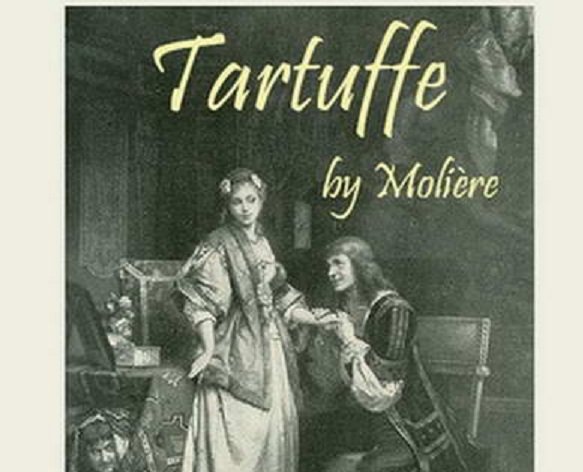About "Tartuffe" by Molière /part 4/
It is known that Molière often introduces into his comedies a hero who directly expresses the author's views on the collisions of the spectators and the philosophy of their opponents. As an incompetent and irreconcilable judge, Cleant is the first to attack, so to speak, "from his stubbornness", his miserly deceived son-in-law, Orgon. Clemant gains the boldness of blaming his brother-in-law Orgon as soon as the most comical and, in fact, the most dramatic premonition of the first act of the comedy "Tartuffe" is played, in which the once-retired, after a long absence, the home and the witty Dorina. Molière has brilliantly created the verbal struggle between the mistress of Dorina's health, who is blinded by Tartuffe foolish godliness Orgon.
Visiting only the care of his guest, Tartuffe Orgon, careless of the health of his wife with a tragicomic insistence, he always asks, "What about Tartuffe?" This queasy and ridiculous tragic subject is resumed four times in the celebrated scene, (the sudden sickness of the wife), exclamation "Ah, the poor man!", also inappropriately pronounced four times. The ultimate disinterest of the deluded Orgon about the state of Elmira greatly diminishes the joy of the viewers. Because they perceive that the master's favor with the intruder in him has exceeded the sensible measure, estranged perhaps the fatally wife of Orgon by his wife. Maybe as a kind of lesson for her blind man, Elmira, with an extraordinary rich artistic, "punishes" his naive loyalty later, playing as a deliberately hidden viewer, the role of "passionately in love" in Tartuffe. Here comes the moment when we should turn our analytical look to the already appearing before us (III action, scene 2) Tartuffe.
Even in his first replica, the protagonist in the play is acting as a duplicator of the audience. He urges, as a matter of urgency, because he sees Dorina, his servant Laurent hide the "bullshit and the sharpened shirt" - a call with which the hero wants to establish himself as an ascetic as, as we shall soon see, he is not. the false pious Tartuffetends to keep others in error: "Do they ask me, I'm in jail, tell me I've gone with a gift for the prodigal souls." With his first inaccurate words and actions, Tartuffe sets audiences to the critical view of his own person. Molière 's hero, brilliantly conceived by his creator, provokes mistrust, prudence, and increased rational activity in his evaluating viewer or reader. The inescapable reminder of the scourge of the scourge and the sculptor, immediately after the pretentious remark to Dorina to cover her deep neckline, and later the not-so-called "gallant" words to check the female responsiveness of his benefactor's wife - all these strangles in Tartuffe's behavior makes the unclean thoughts of a corrupt hypocrite. They can be perceived and interpreted in both comical and seriously dramatic ways.
The miracles of the mistreated hypocrite suggest the creative maid Dorina how to make the most memorable guest of the home of the house, how to uncover his criminal, unambiguously sensual aspirations and thus refuse Orgon of the unwise decision to destroy the happiness of his daughter, Mariana, as he plans to associate her with a male-sweetheart. The impulse of the incessant suitor, Tartuffe, convinces the generally indefatigable Elmira that she must act to achieve the more recent marriage of choice between Mariana and Valer that she must pretend to be a woman "suddenly enveloped by love" to the impoverished seducer Tartuffe, in order to be able to persuade his own husband in his duplicity. Before the fruitful design of the cunning Dorina, Moliere put into action another, far more straightforward and more open-minded, "helper" to reveal the true face of the tortured pious Tartuff. This is the inexorable Damius, the son of Orgon, who can not resign that Mariana's sister's marriage is delayed and his dream of getting married to Valer's sister soon. Damis finds himself involuntarily witnessed by the very little godly verbal provocations by which the hypocritical Tartuffeinvokes his own mother's mistrust (III Action, Scene 3). The efforts of the dignity of a fair rage, Damis, to convince his father that the unscrupulous slayer Tartuffedishonored his wife Elmira's "sinful passion".

wow amazing
WARNING - The message you received from @fatimaah is a CONFIRMED SCAM!
DO NOT FOLLOW any instruction and DO NOT CLICK on any link in the comment!
For more information about this scam, read this post:
https://steemit.com/steemit/@arcange/phishing-site-reported-steem-link-premium
https://steemit.com/steemit/@arcange/anti-phishing-war-the-crooks-continue-their-bashing-campaign
If you find my work to protect you and the community valuable, please consider to upvote this warning or to vote for my witness.
Superlike from My side @godflesh I also like all the parts!
Liked.jpg